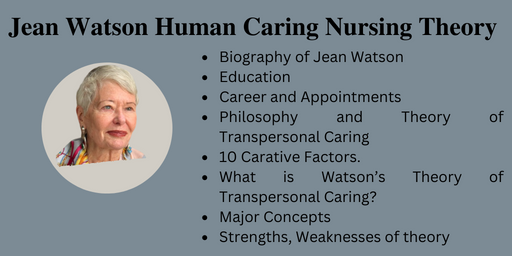Jean Watson Human Caring Theory
Introduction:
Watson’s theory of human caring Nursing has radically changed over the last century. It has developed since healthcare attendants are conscious about the health and well-being of their patients. As view of history taken it can be observed that nursing care has an own impact on health care systems.
The
main focus of nursing practices is “care”. Jeans Watson theory is based on
patient care for nurses because care is the core of nursing profession. It is
admitted that nursing profession also based on skills but care is the main
focus of nursing profession.
Discussion: Nurses should be passionate to help the patient; it will make their job enjoyable. This act of care not merely associated to patient only but family is also its recipient. It is not wrong to say that, this spirit of care also made them more passionate and competent for versatile situation in the future.
The theorists of any subjects to be studies give a click to its
professionals to be stick to their goals. In the same way Jean Watson’s theory
of care also click me to promote better patient care. She was listed in some
pioneer of nursing theorists who consider “Care” as a core element of concept
behind nursing profession. (Alligood and Tomey, 2010)
Biography of Jean Watson
Jean Watson belonged to America born in 1940 on 10th of June. She
is nursing professor and famous for theory “Philosophy and Theory of
Transpersonal Caring.” Her text is light for professionals such as: Philosophy
and Science of Caring.
Education
In very young age she enthusiastically got her bachelor degree in
nursing in 1964, a master of science in psychiatric and mental health nursing
in 1966, and a Ph.D. psychology and counseling in 1973, all from the University
of Colorado at Boulder.
Career and Appointments
She served as a faculty and administrator level after her Ph.D , in the School of Nursing faculty, University of Colorado Health Sciences Center in Denver. Jean Watson and her colleague jointly started a Center of Human Care at University of Colorado; it was first interdisciplinary center, using human care knowledge for clinical practices, scholarship, administrative and leadership that was only one of its own types.
This institute was sponsoring all type of humane care project e.g. clinical, educational and community care. The scholars of this institute were not only national resident but some international scholar were also the part of their team.
She was taking over the undergraduate programs at the University Of Colorado School Of Nursing as a chairperson and assistant dean. She also took part as a coordinator in the planning and implementing the nursing Ph.D programs during 1978 and 1981.
She served as Dean of University of Colorado School of Nursing and Associate Director of Nursing Practice at University Hospital from 1983-1990.
During her
deanship, she was instrumental in developing a post-baccalaureate nursing
curriculum in human caring, health, and healing that led to a Nursing Doctorate
(ND), a professional clinical doctoral degree that in 2005 became the Doctor of
Nursing Practice (DNP) degree.(lab, 13fab2021).
Philosophy and Theory of Transpersonal Caring
Her theory was based on the concept, how care given to patient in
an expressional way. The main concern of
the theory was to emphasize on the use of humanistic manners with the
scientific and nursing care knowledge.
The nursing model states that “nursing is concerned with promoting health, preventing illness, caring for the sick, and restoring health. It focuses on health promotion, along with the treatment of illnesses.
According
to the Watson the humanistic care of patient give more better outcome as
compare to medical cure only. According to her the nursing care is concerned
with the holistic approach.(Knestrick and Lohri-Posey, 2005)
The theory described that nurse can demonstrate and practice. The
environment contributes in accepting way and looks to what looks to what they
become, it also promote the growth of patient. (lab, 13fab2021)
Person or human being, health and nursing are the three of four meeting paradigm that Watson defined. According her the philosophical view of anybody considered fully functional integrated self; and nurses are the care giver to human being that is valued persons.
Human being is not only a combination of anatomically coordination of some physical part but it is more than that he or she looking. On the other hand health is a combination of high level functioning aspects of physical, social, mental and absence of any illness along with adaptive maintenance and daily functioning.
Nursing described as a science of persons and health-illness
experience based on professional,
personal, scientific, and ethical care interactions.(lab, 13fab2021).
There was not defined the fourth met paradigm concept of the
environment. There are 10 caring needs specific carative factors critical to
the caring human experience that need to be addressed by nurses with their
patients when in a caring role.(Watson, 1999)
10 Carative Factors
Following are Watson’s 10 carative factors :
(1) forming
humanistic-altruistic value systems, (2) instilling faith-hope, (3) cultivating
a sensitivity to self and others, (4) developing a helping-trust relationship,
(5) promoting an expression of feelings, (6) using problem-solving for
decision-making, (7) promoting teaching-learning, (8) promoting a supportive
environment, (9) assisting with the gratification of human needs, and (10)
allowing for existential-phenomenological forces.(Watson, 2006)
For the fulfillment of human needs, her hierarchy of needs begins with most basic biophysical needs or survival needs, including the need for food and fluid, elimination, and ventilation. Next are the most basic life needs psychophysical needs or functional needs, including the need for mobility, inactivity, and sexuality.
On the other
side higher-order psychosocial needs or
integrative needs include the need for achievement and affiliation. At the end
, the higher-order intrapersonal-interpersonal need or growth-seeking need,
which is self-actualization.





Give your opinion if have any.